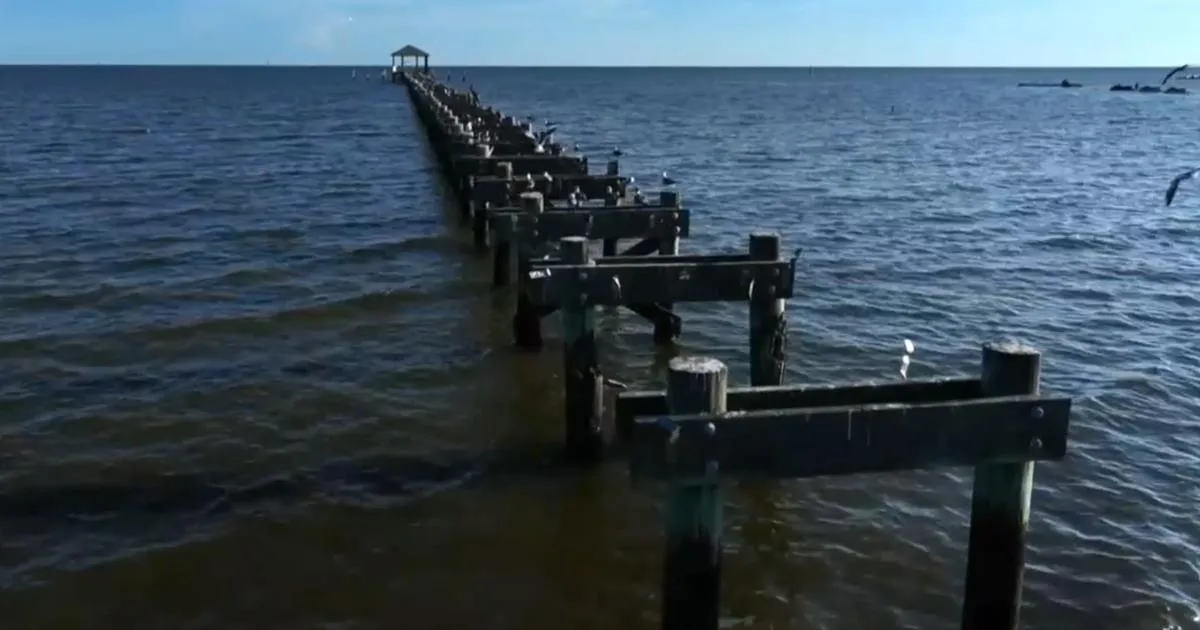
BILOXI, MISSISSIPPI — This past Friday marked the 20th anniversary of Hurricane Katrina, which made its second and most devastating landfall in the United States. The storm, classified as a Category 3 hurricane, struck just southeast of New Orleans, leaving behind a trail of destruction that transformed New Orleans forever. However, the impact of Katrina extended far beyond Louisiana, with significant damage also inflicted on parts of the Gulf Coast, notably in Alabama and Mississippi. Today, as Biloxi, Mississippi, reflects on the two decades since the storm, the city is still grappling with the long road to recovery.
Mayor Andrew "FoFo" Gilich of Biloxi has described the city's struggle to rebuild as a "constant battle" with the Federal Emergency Management Agency (FEMA) over funding. In a bid to construct a new pier that is stronger and more resilient than before, the city has requested $4 million. However, FEMA has countered with a proposal of only $555,000. "That amount is absolutely ridiculous; you can't build anything with that," Gilich expressed in an interview with CBS News.
One of the most pressing unresolved projects in Biloxi is the upgrade of the city’s sewage and stormwater systems. These enhancements are vital for protecting the city from future storms. Gilich emphasized, "We can't bid these last two projects unless we have assurance of funding." He further revealed that FEMA still owes Biloxi $34 million for work that was planned nearly 20 years ago. The agency has indicated that it will not release the funds until Biloxi initiates the final phase of the project, but the mayor is hesitant to start without guaranteed financing to see it through.
The ever-increasing costs of materials and labor have complicated matters, with Gilich now estimating that the city needs $111 million to complete the necessary upgrades. Unfortunately, FEMA has denied his requests for additional funds on two separate occasions. "I'm not bashful. They [FEMA] understand our concerns," Gilich said, expressing frustration over what he perceives as inadequate treatment of his city.
This summer, Biloxi submitted a second appeal to FEMA regarding their funding request. The city is not alone in facing these challenges; CBS News has uncovered that 254 other FEMA Katrina relief projects across Louisiana and Mississippi remain incomplete. Gilich likened his experience with FEMA to dealing with insurance agents: "The delay, depose and deny," he lamented. Adding to the complexity of the situation is the ongoing debate surrounding potential reforms within FEMA, particularly under the Trump administration, which has proposed cuts to some disaster mitigation grants.
Recent reports revealed that FEMA has lost approximately one-third of its staff due to firings and buyouts. Furthermore, an open letter signed by 181 current and former FEMA officials raised concerns that the White House's changes to the agency could undo critical reforms established after Katrina. Notably, over 20 employees who publicly endorsed the letter have since faced suspension.
In a recent congressional testimony, U.S. Secretary of Homeland Security Kristi Noem acknowledged the outstanding claims with FEMA stemming from Hurricane Katrina. She emphasized the need for integrity in handling disaster relief and the importance of empowering states and localities in their emergency response efforts. Gilich has made three trips to Washington, D.C., this year to advocate for Biloxi and expressed cautious optimism about securing the necessary funding, envisioning that the rebuilding process could be completed within three years. "The end result is righteous," he indicated. "It's going to be something that can withstand whatever Mother Nature throws at us."
In a statement to CBS News regarding communities still awaiting post-Katrina funding, a FEMA spokesperson described the situation as "ridiculous, unacceptable, and absurd." They acknowledged that FEMA is still processing claims from a disaster that occurred two decades ago, citing it as an example of bureaucratic inefficiency. The spokesperson reaffirmed the agency's commitment to moving away from a "bloated, DC-centric model" toward a more agile disaster response framework focusing on empowering state and local governments.
FEMA noted that it has provided substantial federal assistance to impacted states, totaling over $6.6 billion in Individual Assistance and more than $17.1 billion in Public Assistance for recovery projects. As Biloxi continues its fight for funding and recovery, the city remains hopeful that progress will be made, allowing its community to heal and rebuild after the devastation of Hurricane Katrina.